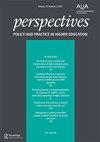危机和冲突时期的翻译
Q2 Social Sciences
Perspectives: Policy and Practice in Higher Education
Pub Date : 2023-05-04
DOI:10.1080/0907676X.2023.2196166
引用次数: 0
摘要
摘要本文是对一个主题问题的介绍,汇集了大量文章,深入探讨翻译和口译在冲突和/或危机情况下的作用。在过去的十年里,人们对危机和冲突如何形成或由翻译形成的兴趣产生了越来越多的出版物。值得注意的是Federici、O'Brien和他们的同事所做的工作,他们研究了危机时期翻译的重要性,以及Baker的出版物,他专注于翻译和冲突之间的联系。对这一专题的贡献考察了口译员的地位、翻译在传递记忆中的重要性、翻译人员在历史中所扮演的角色以及翻译在制造冲突中的作用。本文章由计算机程序翻译,如有差异,请以英文原文为准。
Translation in times of crises and conflicts
ABSTRACT This article serves as an introduction to a thematic issue gathering a number of articles that delve into the role that translation and interpreting play in situations of conflict and/or crisis. The interest in how crises and conflicts shape or are shaped by translation has produced an increasing bulk of publications over the past decade. Of note is the work carried out by Federici, O’Brien and their colleagues, who have studied the importance of translation in times of crises, as well as the publications by Baker, who has focused on the interface between translation and conflict. The contributions to this thematic issue examine the position of the interpreter, the importance of translation in the transmission of memory, the role that translators played in history and the use of translation in the creation of conflicts.
求助全文
通过发布文献求助,成功后即可免费获取论文全文。
去求助
来源期刊

Perspectives: Policy and Practice in Higher Education
Social Sciences-Education
CiteScore
2.50
自引率
0.00%
发文量
24
 求助内容:
求助内容: 应助结果提醒方式:
应助结果提醒方式:


